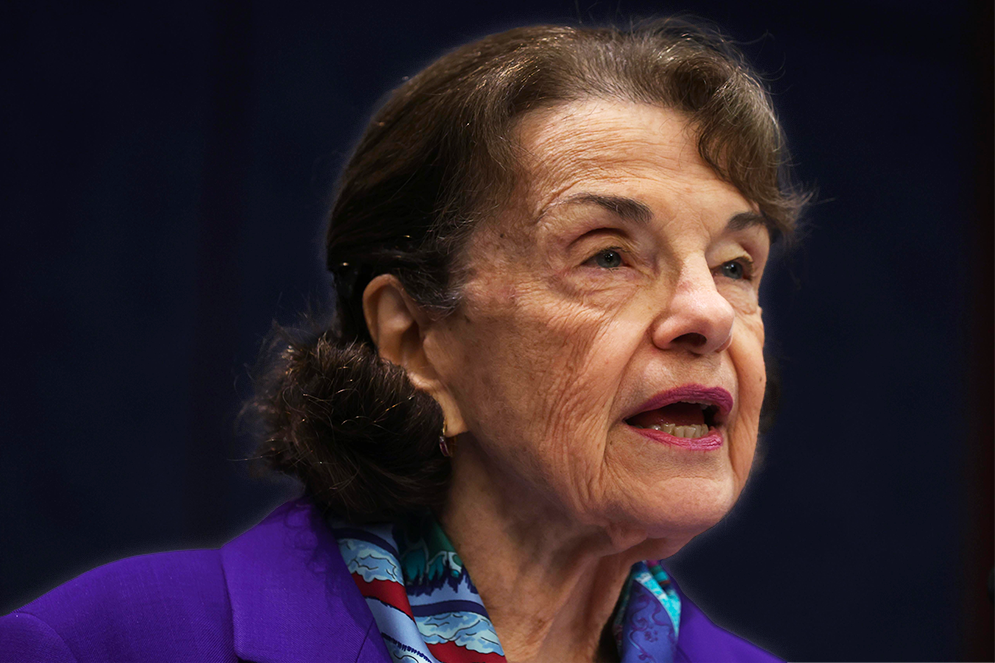Dianne Feinstein’s Death Instantly Creates Two Big Problems to Solve

- Oops!Something went wrong.Please try again later.
- Oops!Something went wrong.Please try again later.
California Sen. Dianne Feinstein has died at age 90, her office announced on Friday. A political legend whose health had deteriorated sharply of late, Feinstein had voted on the Senate floor as recently as late Thursday morning.
While there will be a lengthy period of well-deserved tributes to her in the coming days and weeks, her passing raises a couple of imminent questions for California politics, and the Senate, going forward.
The first question is who California Gov. Gavin Newsom will appoint to replace Feinstein in the Senate. In 2021, after Newsom appointed now–Sen. Alex Padilla to replace newly minted Vice President Kamala Harris, he pledged to appoint a Black woman to serve the remainder of Feinstein’s term should she leave the body. The most obvious choice would have been California Rep. Barbara Lee, a veteran Bay Area congresswoman and an icon on the left. Lee, however, announced a candidacy for a full term to Feinstein’s Senate seat in the 2024 election, so selecting Lee now would be seen as giving her a leg up in that race against her fellow Democratic representatives, Adam Schiff and Katie Porter. In an interview in early September, Newsom said he wouldn’t do that.
“It would be completely unfair to the Democrats that have worked their tail off,” Newsom said on Meet the Press. “That primary is just a matter of months away. I don’t want to tip the balance of that.” He maintained his pledge to select a Black woman, however, in the event of a vacancy.
The second question is what will happen with Feinstein’s crucial tie-breaking seat on the Judiciary Committee.
A number of prominent Democrats, including those on the Judiciary Committee, had argued this year against Feinstein resigning on the grounds that Republicans would filibuster her replacement on the committee, deadlocking its membership and limiting Democrats’ efforts to process judicial nominations. Republicans had already blocked a Democratic request earlier in the year, while Feinstein was on a lengthy hiatus from the Senate, to temporarily swap in another Democratic senator to her Judiciary seat. So Feinstein returned to Washington from her bout with shingles, sooner than may have been medically advisable, to serve as that tie-breaking vote in committee on Biden’s more partisan nominations.
But to filibuster Feinstein’s replacement on the Judiciary Committee would be a horse of a different color than filibustering a temporary swap, and Senate Republican leaders were already throwing cold water on the idea by mid-Friday. Regardless of what one may think of Senate Republicans’ history of hardball tactics when it comes to judicial nominations, blocking a majority party from having a committee majority, just for kicks, would set an extraordinary new precedent that wouldn’t end well for anyone.
Committee rosters are set by Senate resolution. Typically, they’re approved by unanimous consent at the beginning of a new Congress or whenever a vacancy arises. If a Republican (or Republicans) chose to block that move, and Senate Democrats could not muster 60 votes to overcome it, the Senate itself would become a whole new ballgame.
If the minority party does not let the majority party assume a majority on a committee, that would be the sort of blow to representative democracy for which the appropriate response is to nuke the filibuster for committee assignments. Should Democrats not muster the votes to eliminate the filibuster for committee assignments, then the appropriate response would be to filibuster Republicans from assuming a majority on any committee the next time they take the Senate majority.
It was not a path that any Senate Republicans indicated they’d go down in the event of Feinstein’s resignation or passing when asked about it earlier in the year.
“Because they have a majority, they’re entitled to a one-seat vote majority on that committee,” no less than Missouri Sen. Josh Hawley told Insider in July, while Iowa Sen. Chuck Grassley said, “we wouldn’t do that.” South Carolina Sen. Lindsey Graham, the top Republican on the Judiciary Committee, told CNN in April that if Feinstein “does resign, I would be in the camp of following the precedent of the Senate, replacing the person, consistent with what we have done in the past.”
Now, we know that Senate Republicans have a reputation for flexibility in their commitments when it comes to the federal bench. Many of these senators, most notably Graham himself, underwent a sharp conversion between 2016 and 2020 on the propriety of confirming Supreme Court nominees just before presidential elections. The risks associated with those decisions—first to deny Merrick Garland a confirmation process following Justice Antonin Scalia’s death in 2016, and then to rush Amy Coney Barrett to the bench following Justice Ruth Bader Ginsburg’s death in 2020—were entirely political.
A new precedent in which the majority can’t redistribute a deceased senator’s committee assignments, and thus can’t achieve a majority on committees, would risk more than just political backlash. Republicans have an excellent chance of retaking the Senate majority in the 2024 election. If they do, they would probably like the ability to seat majorities on their committees in January 2025. And by the way: Senate Republicans aren’t all sprightly, youthful, and vigorous themselves. Should a member of their conference exit the mortal realm, they wouldn’t want those committee seats interred with the deceased, either.
Republicans could face some pressure from the right to pick this fight. But it wouldn’t be a garden-variety scrap to follow through on.

